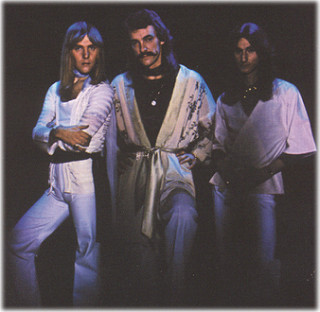Known for their songs “Tom Sawyer” and “Limelight,” the progressive rock band Rush has had a career spanning over forty years with nineteen studio albums and eleven live albums. There is no doubt that the band members are inductees of the Rock and Roll Hall of Fame. Inspired by bands like Led Zeppelin, Yes, and Genesis, Rush set out to create their own style of music and to prove to the world that they had their own story, and indeed they did. In 1979, Canada gave the band the title of Ambassadors of Music. Members of Rush are also official officers of the Order Of Canada, the highest honor a civilian can receive in Canada. With all the success that the band has had, it didn’t happen overnight. In fact, it was not until the band’s fourth album that it started to gain the kind of popularity that it sought after.1
Young Geddy Lee and Alex Lifeson migrated from eastern Europe in the early 50’s to leave behind the wreckage in their home countries following World War II. They met each other in junior high school in Toronto, Canada. They were often alone in their early years of childhood due to their Jewish and Serbian descent. Because of this, the music they listened to played a vital role in the development of their young lives. Bands like The Doors, The Beatles, Jimmy Hendrix, Led Zeppelin, and The Who inspired them to take up rock music in their middle school and high school years. They loved music so much that they formed their own band, and they developed a love of playing together and making music together. In 1968, Geddy was approached to play at a friend’s party, and he knew exactly who he could call on to play with him, and a drummer by the name of John Rutsey joined the band, which they called The Projection. Rutsey’s brother gave them the idea to change the band name to Rush, and all three boys loved it.2
The early 70’s were Rush’s debut years. They performed gigs wherever they could, especially in high schools and nightclubs.3 The band members all made the choice to drop out of high school and pursue their music full time when the drinking age in Canada was lowered from twenty-one to eighteen in 1971. Rush was determined to take advantage of the chance they were given. The new nightlife would grant the young band time to practice their music and give them a chance to gain a voice in the crazy world of Rock music. Ray Danniels, talent manager and founder of the SRO management group, had his own label and signed them as his clients and helped them record their self-titled debut album Rush in 1974.4 The band sold 500,000 units and a Cleveland radio station skyrocketed Rush’s fanbase, but because of the similarities to the bands that inspired Rush, they were often thought to be those other bands. Rush learned what the fans liked, but they soon discovered that their music needed to be written in a way that gave them their own style.5

Rush was picked up by Mercury records in 1974. The band was becoming popular and had to think about what their future together would look like. It wouldn’t be long before the studio would demand more practice and touring times. The early lifestyle was hard on all three members, especially on the band’s drummer John Rutsy, who was born with diabetes, and the lifestyle that the band had developed was not suitable for his condition. Meanwhile, Geddy and Alex were leaning towards a softer sound with more meaningful lyrics, while John wanted to go into a louder, heavy-metal direction. So the band made the decision to let John go and allow himself to get better.6 At the same time, Mercury Records was pushing the band to produce a second album, and fast. With a deadline coming in a month, the band needed a new drummer, so Geddy and Alex held auditions and decided to hire Neil Peart in 1974.7 They noticed right away that Neil was unlike any other drummer they had ever met. He had an extensive vocabulary, and the band’s initial impression was that he was “goofy, but he pounded the crap out of the drums.” Geddy, Alex, and the managers thought Neil was so well spoken that he should take the position of the lyricist. This led to the band writing and recording Fly by Night, the group’s second album, which was released in February 1975.
Fly by Night was different from their first album in that the band leaned towards softer and more meaningful lyrics in their music, as Geddy and Alex had wanted, but the audience didn’t respond well to the new style that Rush was trying to achieve. The studio pushed for the next albums to be in the style of their first, and in an effort to get the band to comply, the studio didn’t allow radio DJ’s to play their music anymore. The band felt that studio was part of the reason that they weren’t doing well in sales. But even with pressures from the studio and the audience, the band felt that the new style they were creating was going to be successful, so with the disapproval from their studio, Rush released their third album Caress of Steel in September 1975.

The initial sales of the album were improving, but they didn’t make up for the damage that the loss of fans, money, and time from the second album had created. This caused the studio to push the band harder to create an album that copied the style of the first, which was essentially the style of Led Zeppelin. The band hated the idea of complying with the demands of the audience and the recording studio. The contract that the band had established with Mercury was for four albums and the band knew that the studio had to support the band. The members of Rush decided that they would rather go out on their own terms than copying the styles of everyone else. Rush decided to write and release a “farewell” album that expressed their own style in 1976. They titled the album 2112. It featured their new style of music with new lyrics. They were not sure how the audience would react to it. It featured the song “2112” that was twenty minutes long and was based on ideas from the books by Ayn Rand, particularly her images of fighting against an oppressive government. The band feared what was to come, but was willing to lose it all, because they felt that 2112 expressed who they were and the style of music that they wanted to be known for.

The sales of the album started slowly, and the band worried about their future. It could mean the end of their musical journey and would force them to get regular jobs, something they had been set against since the beginning of their musical career. In time the fan base grew and sent Rush to the highest point they had ever reached. The fans identified with the new sound and meaning to their work. They loved the deep and meaningful words behind “2112” and, according to producer Terry Brown, “In a time where the people turned to music to help them cope with their lives, Rush gave the people a voice and understood what they had achieved.”8 The band had finally reached the dream that they had had since the beginning. The song “2112” was inspired by The Fountainhead by Ayn Rand, which described a political viewpoint that wasn’t popular then, and many critics called the band “fascists” because of its association with Ayn Rand. They thought that “2112” was encouraging some kind of anarchy; but others, mostly young teenagers, started to read the works of Ayn Rand and learned more about the meaning behind Rush’s lyrics.9 This led the band to become popular with a significant part of young America who identified with the words and sounds of their music. Their songs emphasized responses to “oppression” that resonated in the lives of many average people angered by a variety of “elites.” As time went on, sales of their album grew, concerts sold out, and fans engaged with the band and grew to love Rush. Mercury Records learned its lesson too when it came to telling Rush how they should produce their music. The album 2112 and the song “2112” gave Rush the freedom they desired, and the band was given almost complete co”21ntrol over the way they presented themselves. They were, indeed, relieved that the gamble they took paid off.
Rush’s sound in “2112” has since become known as “progressive metal.” The band became known for standing for the oppressed and the unrepresented. In 1982, Rush released the album Signals containing the song “Subdivisions,” which perfectly encapsulated the message that the band was known for. Here are some of those lyrics:
Growing up it all seems so one-sided
Opinion all provided
The future pre-decided
Detached and subdivided
Nowhere is the dreamer or the misfit so alone…
Any escape might help to smooth
The unattractive truth
But the suburbs have no charms to soothe
The restless dreams of youth.10
The members of Rush are proud that the songs they wrote inspired people and gave them a voice in the times when the oppressed were fearful. In 2013, Rush was inducted into the Rock and Roll Hall of Fame.
2112
- Contemporary Musicians, 1993, s.v. “Rush,” by Simon Glickman. ↵
- Salem Press Biographical Encyclopedia, 2013, s.v. “Rush,” by Deborah Lotsein; Baker’s Biographical Dictionary of Musicians, 2001, s.v. “Rush,” by Hank Bordowitz. ↵
- Contemporary Musicians, 1993, s.v. “Rush,” by Simon Glickman. ↵
- Contemporary Musicians, 1993, s.v. “Rush,” by Simon Glickman. ↵
- Baker’s Biographical Dictionary of Musicians, 2001, s.v. “Rush,” by Hank Bordowitz. ↵
- Contemporary Musicians, 1993, s.v. “Rush,” by Simon Glickman. ↵
- Contemporary Musicians, 1993, s.v. “Rush,” by Simon Glickman. ↵
- Chris McDonald, “Rush, Rock Music and the Middle Class: Dreaming in Middletown (Bloomington, IN: Indiana University Press, 2009), 25. ↵
- Baker’s Biographical Dictionary of Musicians, 2001, s.v. “Rush,” by Hank Bordowitz. ↵
- Geddy Lee, Alex Lifeson, and Neil Peart, “Subdivisions,” in Signals, Mercury Records, 1982. ↵



47 comments
Vanessa Tombo
From the title, I was extremely intrigued because I wanted to know more about the band called Rush. I was not very sure why 2112 was incorporated into the title which intrigued me as well. Prior to reading this, I have never head about the band Rush nor how they rose to success. I also found out that 2112 was significant because it was the album that leads to their success. The incorporated video allowed me to listen and appreciate a band I had never heard of.
Cristina Cabello
It is really interesting to learn about these kinds of people. I like that they wrote meaningful lyrics into their music. Instead of inappropriate things that teens listen to today. I find music as a great way to cope with my emotions. Sometimes I get sad and then other times I just need to celebrate life. The great thing about artists is that they feel these emotions too. then are able to make them into songs so that the whole world can hear them too.
Esperanza Mauricio
Rush’s album 2112 spoke to the people with its meaningful lyrics and transcended within their music. This reminds me of myself and how music has helped me cope with situations within my life and Rush’s album did that for many others. I am very interested with how this album sounds now and want to look into the lyrics of the songs mentioned.
Matthew Wyatt
Whenever I think of Rush my first thought is “Neil Peart is the greatest drummer of all time.” Besides that and the ubiquitous singles, I never really knew anything about them. This article provides a great overview of their impressive and influential career. I’ve never actually listened to 2112 all the way through, and I’m now tempted to do exactly that. The ending of the article feels a little sudden, and could be fleshed out a bit more.
Ximena Mondragon
It is crazy how they released a song that lasted 20 minutes !
Prior to reading this article I knew of the band Rush but I did not know of their music or their origins. Overall, this article is well written and the pictures are great.
Carlos Vazquez
I had never heard of the band Rush. I listened to their music and I am surprised I never heard of them before. This article was really well written and informative and I really enjoyed reading and learning about them and how they became successful. The video was a really nice addition because I was able to listen to the music even though I had never heard of them.
Destiny Renteria
I usually do not like music articles because sometimes they can get quite boring with just mentioning how they were in the top charts, but this article also explains their controversy. It was very well written and it is something to learn about different music especially if you just stick to one taste. I can now listen to their music and try to go and figure out their lyrics just as other teenagers did. Very interesting and I hope to see more like this.
Erin Vento
So after reading this article the first time, I did go and look up some of their music, and I think that reading it again now and being able to think of some of their songs makes the story better appreciated. The article itself is very interesting- the way its written and its topic- and keeps the reading wanting to read; good job!
Anthony Robledo
I found this article after reading about another band that i had not heard of. It is pretty cool learning all of these new bands that i may go and listen to. The history behind Rush is rich and you explain some of it very well. It’s cool that 2112 was a key piece for the success they achieved. Great job on this article. It’s really the best i have read so far on music!
Gloria Baca
Reading about music has always been a interest of mine and especially reading about an artist I am unfamiliar with. I had never heard of Rush but upon reading this article I was very intrigued about the rock band. I enjoyed reading about what the band went through to gain success cause ultimately success is a long hard process. Their music is legendary and this article does a great way in depicting what a peculiar rock band they were. Their music was controversial but made an important mark in the world.